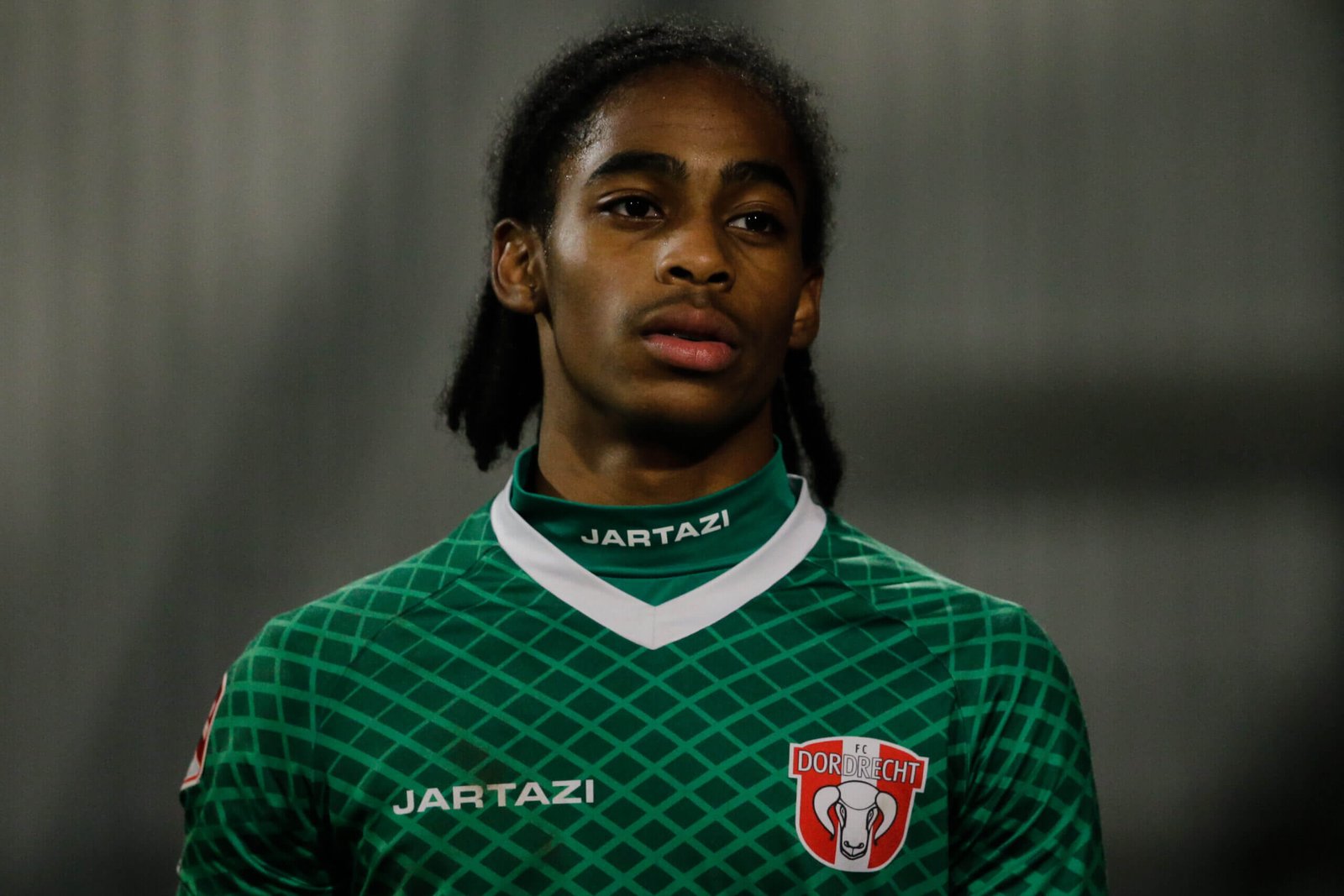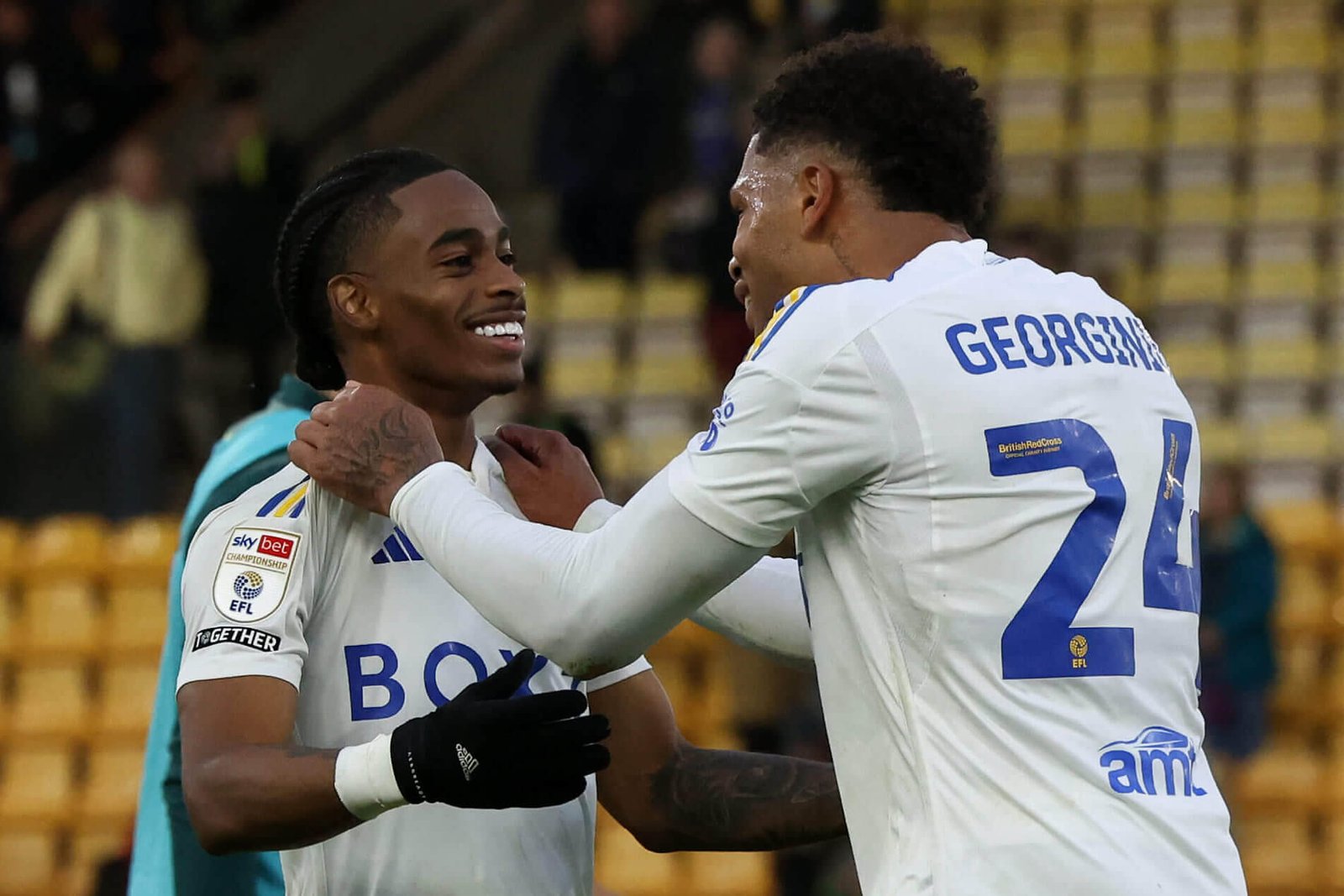This article was originally published in April and has been updated after Crysencio Summerville completed a move from Leeds United to West Ham United.
The golden rule for guaranteeing the maverick, game-changing performances Crysencio Summerville brought to Leeds United last season was simple: “Don’t kill him with a plan.”
Summerville is an unscripted genius with the ball at his feet. The Championship Player of the Season, who has joined West Ham United for about £25 milion, dribbled, dummied and delivered performances worthy of making him the star of Daniel Farke’s side last season. The scariest thing for opponents? He has more to learn.
The 22-year-old Dutchman cannot be bound by defensive blocks or dispirited by cynical fouls and has the potential to be world-class. Summerville’s story is one of belief that started in the youth teams of RVV Noorderkwartier and has taken him from the south of Rotterdam to east London.
Certain conditions are needed to create a player like Summerville. An absence of pressure, a focus on finding joy in the sport and coaches smart enough to know the needs of the individual. All of those factors came together for a young Summerville in his education at the academy of Dutch football side Feyenoord, whom he joined as an under-seven in 2008.
“I first coached him when he was 12 in the under-13s but I knew him from when he was eight or nine,” says Gaston Taument, one of Summerville’s academy coaches at Feyenoord. “He was a typical, classical wide winger. He has a very good family. They’re very close. Every game, every training session, tournament, away game; they were everywhere. If we play in other countries, in Italy with the youth, they would be there.
“One of the good things is this: I’ve trained for 20 years with youth teams and one of the problems is the parents who shout at their kids, who make their kids like a king. It’s a dream of the parents — mostly the father — to have a kid who becomes a professional player. Crysencio’s father was always quiet. When Crysencio was the best player in a tournament, won prizes or played very well, his father was the same. He was calm and he had a distance. No pressure — no pressure from the family at all.”
Summerville in action for the Netherlands’ under-17s against Turkey in 2018 (Laurens Lindhout/Soccrate/Getty Images)
Summerville grew up in the south of Rotterdam in an area described by those close to the player as a tough neighbourhood. With Summerville being slight but technical, it is some luck that the winger progressed through youth football in the Netherlands where academies are less concerned with a player’s size if they show talent. His time at Feyenoord’s Varkenoord training complex saw him work with former Netherlands and Liverpool legend Dirk Kuyt in the under-19s, where Summerville progressed well despite never making a senior appearance.
“Through the whole academy, he played wide so I was very surprised he made a good development in the last year (with Leeds) a little bit more behind the striker, like a No 10, and also playing on the left,” Taument says. “Here, he was always on the right side, in a 4-3-3 — always very wide, one against one, very dominant in those situations.
“He’s been a very good player from the start but he was also little. Everybody was a big fan because he was very technical but he wasn’t so strong. But in Holland, it doesn’t matter so much. The first thought is about technique: how good is it? And Crysensio had a lot of it, very technical.
“I worked with him a lot. When we were training — and this is how it is sometimes because kids are kids — he could be a bit lazy. He knows I would say that about him. The guys trained four times a week, we wanted focus and effort 100 per cent. Sometimes, he would train on 70 per cent. You could see it, you knew it was happening.”
If there were questions about Summerville’s application in training, they did not apply on matchdays. Then, he had only one gear: all in, 100 per cent effort. With big talents, Taument says, “you have to treat them a bit differently”. That was enough to satisfy youth coaches at Feyenoord while they worked on other aspects of his game but they knew that would be tested as soon as he stepped into a first-team environment.
As he learned in his loan spell with Dordrecht at 17, there is nowhere to hide in senior football.
“I didn’t find him lazy,” says Claudio Braga, who coached Summerville during his loan spell with second-tier Dordrecht. “Maybe this was exactly why he made the step from Feyenoord. There, he was with his same-age team-mates, but not with me. With me, he was training with 27-year-old colleagues. The dressing room is a different vibe. Video meetings are a different vibe. It was a really good stimulant.
“With us, every Friday or Saturday, he was playing in front of 12,000, 15,000, 22,000 people in the stadium. So it is very different. Dordrecht is not the same club as Feyenoord but, in the end, the games were at a higher level and speed than the youth games. There are more people there, television is there. For him, it was a good decision.”

Summerville impressed on loan at Dordrecht in the second tier (Laurens Lindhout/Soccrate/Getty Images)
Once he was handed his first start, Summerville needed just six minutes to score his first goal for Dordrecht against Jong PSV. His 18 appearances in the loan spell set him up well for the next step in his career: a loan move to Eredivisie side ADO Den Haag the following season. The step up to the Netherlands’ top division reinforced what Summerville had found throughout his career: as a technical, less physical player, he was more likely to get kicked when defenders could not stop him.
“He was quick to get disappointed,” says Taument of his early years at Feyenoord. “If he didn’t get the ball, or if he had a defender always kicking him, it could make him angry. Other teams knew him and knew what kind of player he was. So, yeah, they would kick him. He’d yell at the referee. Some of them helped him, some of them didn’t. Some of them did nothing.”
“He was a very nice lad to work with, very ambitious,” adds Alfons Groenendijk, who coached Summerville at Den Haag. “We spent a lot of time with him, we gave him his debut in Eredivisie, which is a tough league. We had to be careful because he was becoming a man but he came in as a boy. We spoke a lot — sometimes, we would sit down and have a drink but he would be a bit shy.
“He’s a very nice one to work with and he wanted to invest in himself, so we tried to make him stronger. He got kicked in the Dutch league so we had to be careful with him. He didn’t play in every game and sometimes we had to protect him, but he made big steps and everyone could see his talent, his skills. He was very fast and his dribbling was good. He was starting to score goals too. Even then, we could see that he was something special.”
Inside the polarising world of youth football
The “something special” Summerville brings is his ability to change games from wide areas and when dribbling in one-on-one situations. If there was any criticism to be made of his efforts last season at Leeds, it was that his team-mates too often looked to him to create something from nothing — but to Summerville, that is familiar territory.
“There was one game in front of Twente,” says former Dordrecht coach Braga. “It was in front of 30,000 supporters. It was a show to see him play as he did. It’s not because I worked with him that I’m a fan of him and like him very much. When defenders are compact, in a strong block, you see as a coach that you can have a great plan, you can train well but to find a solution, to break the wall, you need someone like Summerville.
“It was the balance for me as a manager — I need players who follow a plan, who have brains, who are playmakers, leaders. But I also need one or two guys who, when you need to force something, have the courage and the technique to do it. He was that guy.
“It’s true, he has a lot of self-confidence. I like to see the body language and look into the eyes of players, see their confidence. The volume of their voice tells you something, too. Crysencio with me was always in balance. He would say to me, ‘Coach, I’m going to fix this’.”
Summerville’s confidence was crucial in the run-in for Leeds as they chased promotion before losing to Southampton in the Championship play-off final, with boss Farke noting that his and Georginio Rutter’s lively personalities made for a good dressing-room dynamic. The evolution in Summerville’s game from an out-and-out winger to a player capable of thriving in the No 10 position has impressed his former coaches, who have remained in contact with him since he departed from Feyenoord for Leeds in 2020.
“What fascinates me more this year is that I see him playing and finding solutions in the centre of the field,” says Braga. “With us he was more of a winger, always on the line, dribbling vertically. But the speed and his power in the one-against-one, it doesn’t matter if he’s on the side, up front, in behind. It’s what makes him special. We were all looking for consistency for him and, if he can keep it, maybe one day make a jump to the top in the world.
“It’s up to him but any manager who works with him must not kill the talent. Give him space to find solutions and show his quality. He needs to feel the confidence to do his thing in an attacking way. That gives you the power and the strength, everything in his character.”
Signed under Marcelo Bielsa, Summerville’s Leeds career was a slow burn, with his appearances and contributions to the team growing each season. He obliterated his personal best of four goals in 28 games — achieved as Leeds struggled in the Premier League in the 2022-23 season — to thrive under Farke alongside Rutter, another talented 22-year-old. The pair combined frequently for goals, using the drop to the Championship to better establish themselves and thrive.

Rutter and Summerville brought out the best of each other at Leeds (George Tewkesbury/PA Images via Getty Images)
Summerville has not forgotten his roots, with each former coach who spoke to The Athletic noting they remain in touch with the player and monitor his progress. His application and maturity in recent seasons have seen him reach new heights and a commitment to an extended pre-season schedule before the start of last campaign paid off. If Feyenoord had the chance again, they would not allow Summerville to leave for as little as the reported £1.25million ($1.6m at current rates) that Leeds paid for him four years ago.
After another brace in a crucial win against Middlesbrough to keep Leeds, it was hard to see how Farke’s side would have been fighting at the top of the Championship table without his contributions. Summerville’s second goal of the 4-3, a cut in from the wing and curled shot, has become his trademark — effectively, as one person close to the player, called it, “doing the Arjen Robben”.
“The potential is there to achieve big things,” Braga says. “He has the quality and fire inside him. I also believe a lot in his decisions in the future: what kind of manager will work for him, what kind of club is good for him, what will be the environment? I see a lot of boys that are destroyed because they try to make robots of them. They don’t give freedom to this kind of player. Managers only want them to follow plans.
“If he can always have the people around him that fit with his personality and his mind, then he can achieve at the top.”
(Top photo: Ed Sykes/Getty Images)
Read the full article here


